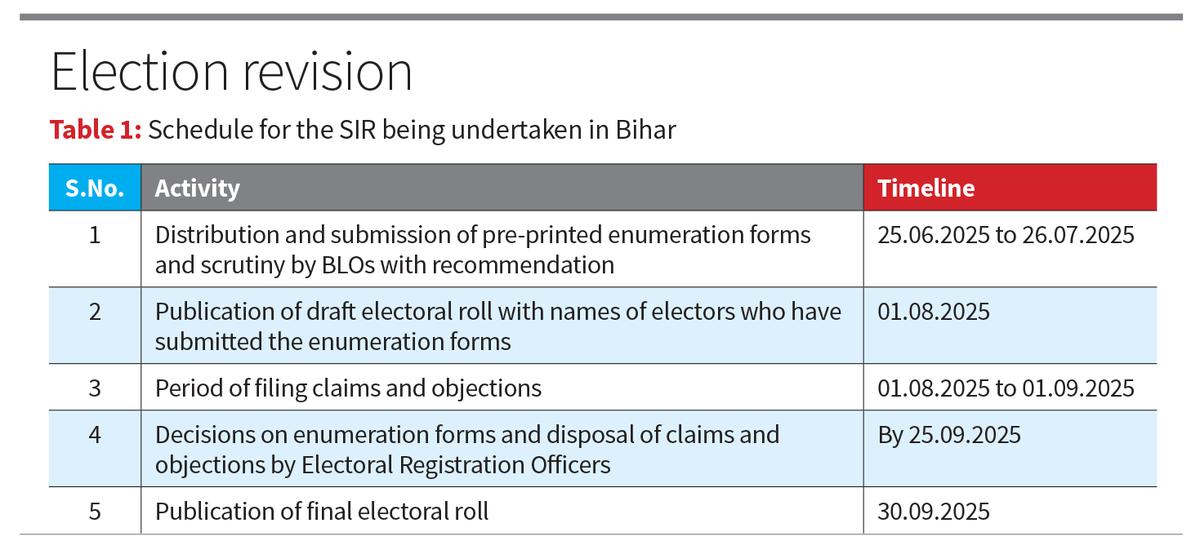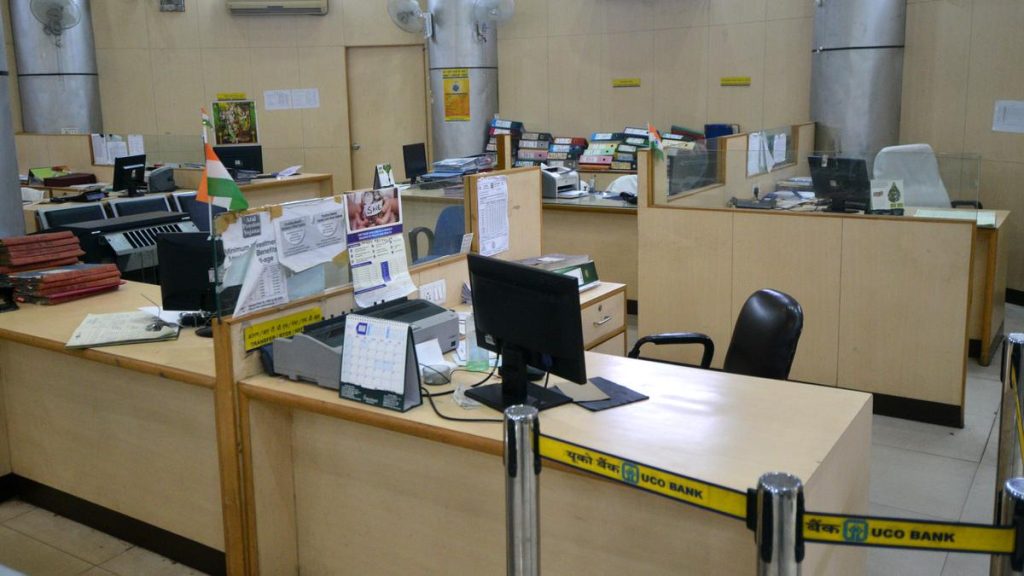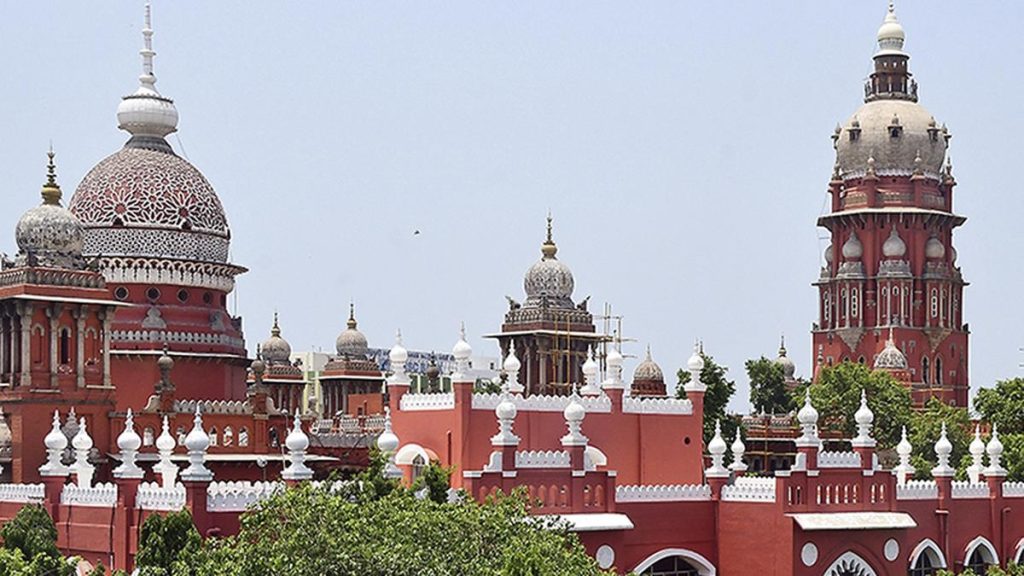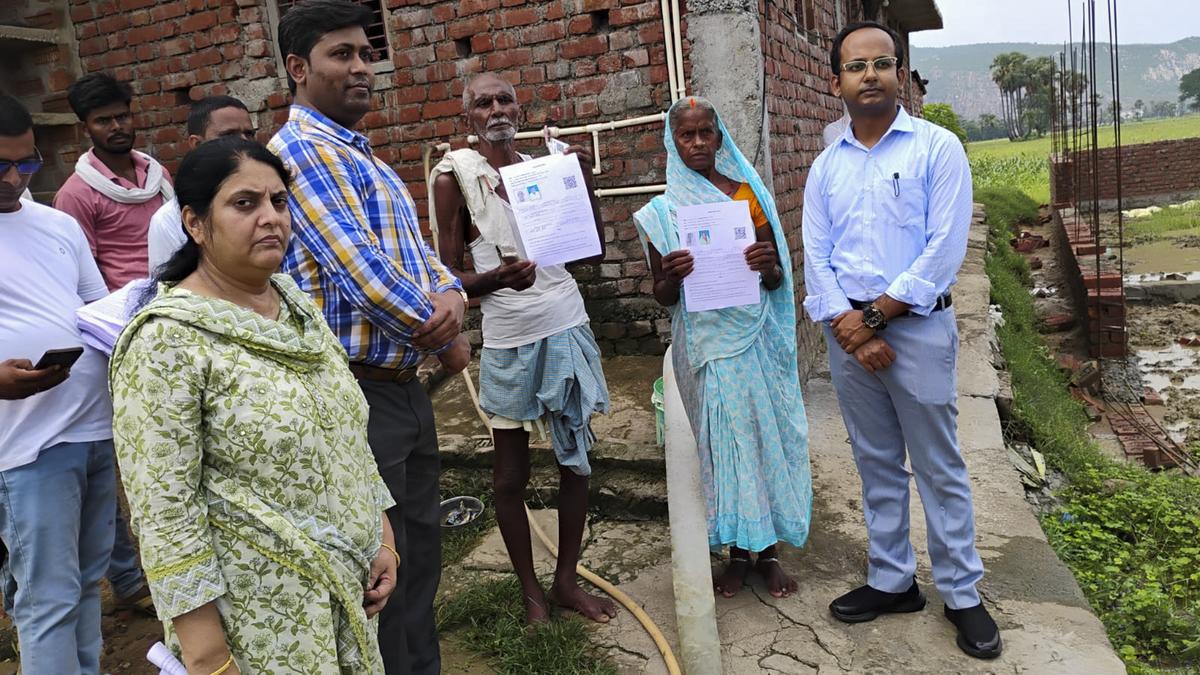The story so far:
The Election Commission of India (EC) has initiated a Special Intensive Revision (SIR) of the electoral rolls in Bihar before the general elections for its Legislative Assembly.
What is an electoral roll?
Article 324 of the Constitution provides that the superintendence, direction and control of the preparation of electoral rolls for the conduct of elections to Parliament and State legislature shall vest with the EC. Article 326 provides that every citizen who is not less than 18 years of age shall be entitled to be registered as a voter (elector).
The electoral rolls are prepared by the EC as per the provisions of the Representation of the People Act, 1950 (RP Act). Section 16 of the RP Act disqualifies a non-citizen from being enrolled in the electoral roll. Section 19 requires that the person is not less than 18 years of age on the qualifying date and is ordinarily resident in the constituency.
Section 20 of the RP Act provides the meaning of the term ‘ordinarily resident’. It specifies that a person shall not be deemed to be ‘ordinarily resident’ in a constituency simply because he/she owns or possesses a dwelling house in such constituency. However, at the same time, a person ‘temporarily absent’ from his/her place of residence shall continue to be ‘ordinarily resident’ therein.
Why has an SIR been initiated?
Section 21 of the RP Act deals with the preparation and revision of electoral rolls. It authorises the EC to carry out a special revision of the electoral roll at any time for reasons to be recorded.
The Election Commission has noted that there have been large scale additions and deletions to the electoral rolls over the last 20 years due to rapid urbanisation and migration. This has increased the possibility of duplicate entries in the roll. The Commission is constitutionally obligated to ensure that only citizens are enrolled in the electoral rolls. Accordingly, the EC has decided to carry out an SIR for the entire country, starting with Bihar.
The last such SIR was carried out for Bihar in the year 2003. Since the Bihar Assembly elections are due in November, the EC has presently laid down the guidelines for an SIR of the Bihar electoral roll with the qualifying date as July 1, 2025.
During the last SIR, enumerators were sent for house-to-house verification with a copy of the details of the existing voters. However, in the present SIR, every elector will have to submit an enumeration form to their respective Booth Level Officers (BLOs). For electors registered in the electoral roll as of January 2003 (on the basis of the last SIR), no further documents are required to be submitted except the extract of the 2003 electoral roll. However, electors registered after January 2003, have to additionally submit documents for establishing the date and place of birth for themselves and their parent(s) as required. The schedule for the current SIR is provided in Table 1.

What are the pros and cons?
There have been arguments for and against the SIR made by various stakeholders. The key issues of contention are summarised below.
The process and time required for the entire exercise: Proponents in support of the SIR in its present form argue that the SIR in 2003 was carried out in 31 days without technological support. This time also the same amount of time will be taken for the exercise with technology. Moreover, there are more than one lakh BLOs, nearly 4 lakh volunteers and more than 1.5 lakh Booth Level Agents (BLAs), appointed by political parties, to ensure the smooth implementation of this exercise.
Counter arguments against the SIR in its present form state that it is a humungous task which involves the submission of forms by all eight crore voters that has never been done before. Furthermore, close to three crore voters would be required to submit documents establishing their date and place of birth for themselves and their parents. Migrant labourers and students may not be able to submit their enumeration forms within the deadline. Despite the presence of so many field level workers, there can be potential errors in inclusion and exclusion.
The exclusion of Aadhaar as a document for registration: Proponents of the SIR in its present form say that the Aadhaar is neither a proof of date of birth nor of citizenship. The Aadhaar card itself carries a disclaimer stating that it can’t be used as proof of citizenship. Hence, in line with constitutional and legal requirements, the Aadhaar has been excluded as a valid document. The list of valid documents include caste certificates, family registers and land allotment certificates.
Proponents against the SIR in its present form argue that the Aadhaar has become an omnibus identity card for all sections of society, especially the under privileged who may not possess any other document. Form 6 for the inclusion of new voters as per the Registration of Electors Rules, 1960 (RER) requires that Aadhaar be provided compulsorily unless the person doesn’t have one. It is mentioned as a proof of date of birth and place of residence as per Form 6. These rules were made by the Central government as per the RP Act. It is only in the SIR guidelines that the EC has added a declaration form to be submitted along with Form 6, with additional documents other than Aadhaar for the purposes of establishing date and place of birth.
Exclusion of migrants from the electoral roll: Arguments for the SIR in its present form state that the RP Act provides that only citizens who are ‘ordinarily resident’ should be included in the electoral roll of a constituency. Migrants who have moved away for long periods of time on account of education or employment would be included in the electoral roll of the constituency of their current residence as per provisions of the RP Act and the RER.
However, counter arguments posit that the RP Act provides that ‘persons temporarily absent’ do not cease to be ‘ordinarily resident’. Many migrant workers shift to other places within the State or outside the State but return at regular intervals to their place of birth/ upbringing. The families and properties of such migrants may continue in the same location where they would want to retain their right to vote. The EC, as recently as January 2023, had indicated its intention of providing a remote voting facility for such migrant workers subject to technical feasibility and acceptance by all stakeholders.
What can be the way forward?
To provide an analogy, the inclusion of an ineligible name in the electoral roll is like a guilty person going scot-free, while the exclusion of an eligible voter is akin to one innocent person suffering. Both these prospects would be a blight on democracy. Therefore, electoral rolls should be thoroughly checked and verified.
First, the proposed timelines for the completion of such a mammoth exercise are stretched. The EC should ensure that adequate safeguards are put in place for the completion of the exercise without errors. The BLAs should actively participate to prevent errors of omission or addition.
Secondly, the exclusion of Aadhaar from the list of valid documents can create issues for many, especially the underprivileged. After considering the ground realities during the first phase of the enumeration, the EC should adequately tailor the process, during the claims and objections phase, to ensure that no eligible citizen is excluded due to their inability to produce any document from the list of valid documents.
Finally, migrant workers should not be removed from the rolls as that can result in significant deletions. Many such migrants have exercised their right to vote in the place of their birth/upbringing as per their choice and should continue to do so. It is pertinent to note that as per the amendment of the RP Act in 2010, non-resident Indians who have shifted out of India, even for the long term on account of employment, education or otherwise, are entitled to register and vote in the constituency in which their address as per passport is located. The issue of duplicate voter IDs for the same person in different constituencies should be addressed through Aadhaar seeding for which the EC had begun its consultative process in March 2025.
Rangarajan. R is a former IAS officer and author of ‘Courseware on Polity Simplified’. He currently trains at Officers IAS Academy. Views expressed are personal.

























